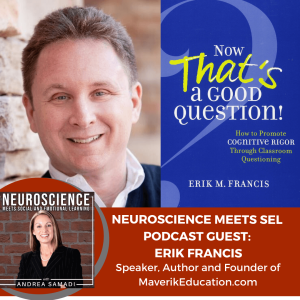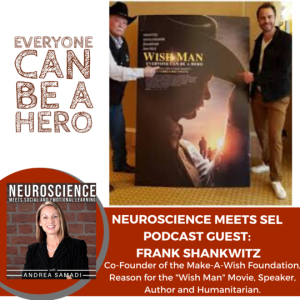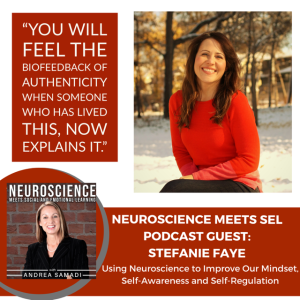2020-02
2020-02



Tuesday Feb 18, 2020
Tuesday Feb 18, 2020
This is episode #41 with Erik Francis, an international author of the book Now THAT'S a Good Question! How to Promote Cognitive Rigor Through Classroom Questioning[i] published by ASCD and presenter with over 20 years of experience working as a classroom teacher, a site administrator, an education program specialist with a state education agency, and a professional development trainer. He’s conducted trainings at K-12 schools, colleges, and universities throughout the United States and internationally in Canada and Singapore. You can watch the interview with visuals on YouTube.
Welcome to the Neuroscience Meets Social and Emotional Learning podcast, my name is Andrea Samadi, I’m a former educator whose been fascinated with understanding the science behind high performance strategies in schools, sports and the workplace for the past 20 years. Each week we bring you an expert who has risen to the top of their industry with specific strategies that you can implement immediately, whether you are a teacher or student in the classroom, or working in the corporate world, to take your results to the next level.
Today, we have Erik Francis, the owner of Maverik Education[ii], where he provides academic professional development and consulting to K-12 schools, colleges, and universities on developing learning environments that challenge students to demonstrate higher order thinking and communicate depth of knowledge (DOK).
Welcome Erik. Thank you so much for being here today (on Valentine’s Day of all days) and for the support you’ve given me over the years as I have been navigating my programs and services in the K-12 school market. It’s always a blessing to have a good friend with your knowledge and understanding so thanks for always lending a hand to help us over here and for coming on today to share your knowledge with others.
Before I get into the questions I have for you, can we first of all talk about cognition or acquiring knowledge and understanding through thought, experience and the senses. This is a powerful concept as to actually think…takes a lot of effort. Then to think up questions takes even more effort.
Q 1: Why did you decide to write your book tying in asking good questions to promote cognitive rigor?
When I saw the title of your book, Now That’s a Good Question…it made me think about The Four Agreements and the fact that we all need to get better at asking questions to gain clarity.
Q 2: What is cognitive rigor and how can we use questions to challenge anyone to think? What about thinking in the corporate world? Can these concepts transfer into the modern workplace?
Q3: I’m really into creating frameworks or graphics of ideas to help bring clarity to complex thoughts or concepts. Then I heard you speak about how someone created a framework of depth of knowledge that spread across the country and was adopted into every state, but it was inaccurate. Can you explain what exactly is depth of knowledge, where the concept came from, and why the D.O.K. Wheel is inaccurate?
Other Thoughts: When you created your graphic, did you consult with other educators? What can we learn from this? Can Depth of Knowledge be translated into the workplace? What about in sports?
Dok 1- What is the knowledge? Recall and Reproduce.
Dok 2- How can that knowledge be used? Apply it or explain it with basic reasoning.
Dok 3- Why can this knowledge be used? Think strategically.
Dok 4- How else can this knowledge be used? Think extensively.
Apply to the Classroom, workplace, sports?
Q 4: I’m thinking of when I first saw a graphic created by Casel.org for the 5 sel competencies. I had been working with concepts that we used to call soft skills since the late 1990s and used Casel’s 5 competencies, adding in carol dwecks growth mindset to come up with my framework for SEL. Having a framework brings clarity to complex ideas.
When did you first recognize that this graphic needed to be changed? What did you do next to instigate this change? Did you receive criticism for your thoughts?
Q 5: What are the results of improving questioning in the classroom? What about your own children at home? How are you personally using these ideas?
Other thoughts:
What would your vision be for the classroom of the future? How can we go from where we are now to where these changes can be made?
Who at the school level needs to be involved in these changes to infiltrate into our classrooms? What can we do as parents at home?
Q 6: What are you working on now? Your second book on Depth of Knowledge?
If anyone wants to contact you, is the best way through maverikeducation.com? Where else can people reach you?
Thank you so much Erik for your time, knowledge and ideas to encourage all of us to think, and ask questions to gain new knowledge. I look forward to the release of your next book and to continue following your work in this exciting field.
REFERENCES:
[i] Now That’s a Good Question http://www.ascd.org/Publications/Books/Overview/Now-Thats-a-Good-Question-How-to-Promote-Cognitive-Rigor-Through-Classroom-Questioning.aspx
[ii] Maverick Education LLC https://maverikeducation.com/



Sunday Feb 09, 2020
Sunday Feb 09, 2020
This is episode #40 with Frank Shankwitz, the co-founder of the Make-A-Wish Foundation, who was identified as one of the "10 Most Amazing Arizonans"[i] and if you don’t already know who Frank Shankwitz is, I hope that you will go and find his biographical movie on Netflix (The Wish Man) and watch it. I have been following the making of his movie for at least the past 5 years, as we both belong to a networking group that supports entrepreneurial visions. There are few words to describe someone like Frank, but I think it goes so much deeper than just one of 10 amazing Arizonans. Watch the visuals on YouTube here.
Frank is a former Arizona Highway Patrol officer turned Wish Man, who granted the "wish" of a 7-year old boy with leukemia, whose wish was to be a Highway Patrol officer. If you watch the movie, you’ll see how Frank made his wish come true and the rest is history with his vision of The Make-A-Wish Foundation. Frank has spent most of his adult life seeking to fulfill the dreams of others no matter how big or small. If you have ever met a child who has gone through leukemia, it’s devastating for the family as well as for the child. A few years ago, my husband’s best friend from high school, called one night to let him know that his daughter, who was my husband’s god daughter, was diagnosed with leukemia and we watched first-hand the years of treatment involved along with everything that goes into ensuring the well-being of that child. Back then, I didn’t realize it was Frank who was behind the Make-A-Wish Foundation (even though I was following the making of his movie, The Wish Man) and that it was his idea behind the organization that gives so much back to families in their years of treatment, to offer some stress relief, peace and support.
Frank has changed the lives of thousands of people through his generosity, grit, and belief in the human spirit. Because of his work, he has received the President's Call to Service Award[ii], the Making a Difference in the World, and the Ellis Island Medal of Honor awards.[iii]
Frank, it is such an honor to speak with you today. I just wish we could be speaking face to face since we are both located in Arizona. Before we even get into the questions about your book and movie, I do have to first of all honor you for all the years you dedicated to law enforcement through AZ Department of Public Safety. My husband, along with his fulltime job, is a commander with the sheriff’s posse with the Maricopa Sheriff’s office, so we have a deep understanding of the sacrifices that are made by law enforcement officers on a day to day basis when they are going out every day to help, give back, give away their time and often put themselves in the seat of danger, to make a difference. Thank you for these years of service that I see from your LinkedIn began a year after I was born!
Question 1: Frank, I watched the formation of your book turn into a movie, though our mutual friend Greg Reid, and I didn’t fully know your story back then until I watched your movie and then followed you through social media. Can you give an overview of where this all started? How did your life become a book, and then a movie which I just watched was in the running for an Oscar?
Question 2: Who helped you with all that you needed to know to take your movie to these heights? There are so many little details that you would have needed to know, especially the criteria for an Oscar. Who helped/guided you along the way?
Question 3: In our podcast, we talk about social and emotional skills that we see are missing in today’s world. Skills that I know you recognize like empathy for others and giving back. They are making their way into schools, but students are not prepared for the workplace with these basic skills (we call them emotional intelligence skills in the workplace). What skills do you think are missing from our schools, and how do you see this impacting the workplace and society?
Question 4: With all of your years of experience working with Arizona’s Highway Patrol, and then looking back at everything you have done, (the book and movie) what message would you have for listeners that you think is important for us to hear?
Question 5: I watched the process of your movie being created, through Greg Reid who posts on Facebook about everything, and it feels like the movie was in production for a long time (was it about 5 years?) What were some of the most valuable lessons you learned from making this movie?
Question 6: What’s next for you? I know that you do public speaking. If anyone wants to reach you, is the best place your website https://www.wishman1.com/
Thank you so much Frank for taking the time today to speak with me and share your fascinating story. I’ve enjoyed getting to know you a bit more through social media and hope to meet you some day soon.
BIO:
Frank was presented with an Honorary Doctorate Degree, Doctor of Law, from St. Norbert Frank Shankwitz[iv] was a member of the Arizona Highway Patrol's ten man tactical unit[v] that covered the entire state by motorcycle, he stayed in the police department for 42-years before retiring in 2014. After 18-months he passed on the Make-A-Wish Foundation to more capable hands who he said, 'turned it into what it is today'
June 2019, Frank joined 89 celebrities, when he received his
REFERENCES:
[i]Arizona Central Published Dec. 30th, 2015 https://www.azcentral.com/story/news/local/best-reads/2015/12/30/amazing-arizonans-make-a-wish-frank-shankwitz/77373092/
https://www.wishman1.com/media-awards
[ii] https://en.wikipedia.org/wiki/President%27s_Call_to_Service_Award
[iii] https://www.wishman1.com/media-awards
[iv] https://en.wikipedia.org/wiki/Frank_Shankwitz
[v] Published in the Daily Mail August 31, 2019 https://www.dailymail.co.uk/news/article-7413151/Biopic-Wish-Man-covers-life-Arizona-Highway-Patrolman-Frank-Shankwitz-founder-Make-Wish-foundation.html



Monday Feb 03, 2020
Monday Feb 03, 2020
This is episode #39 with neuroscience researcher and clinician Stefanie Faye, whose research is focused on brainwaves, heart rhythms and micro-movements[i] that influence our ability to self-regulate and build healthy relationships. Listen to the interview here or watch the YouTube for the visuals.
Welcome to the Neuroscience Meets Social and Emotional Learning podcast, my name is Andrea Samadi, I’m a former educator whose been fascinated with understanding the science behind high performance strategies in schools, sports and the workplace for the past 20 years. Each week we bring you an expert who has risen to the top of their industry with specific strategies that you can implement immediately, whether you are a teacher or student in the classroom, or working in the corporate world, to take your results to the next level.
I’ve got to give you a bit more background on Stefanie Faye Frank, whose graduate research at New York University and fieldwork at the NYU Phelps lab for neuroscience research, the NYU Institute for Prevention Science and Yeshiva University's Albert Einstein College of Medicine focused on the cross-section of self-directed neuroplasticity, empathy and social justice. For the past decade, she’s been teaching and consulting in countries all over the world by combining scientific insights and her training in monasteries with meditation masters from India, Africa and Vietnam. She has delivered a series of workshops for Google's Analytics Academy in London, Chicago, Tel Aviv, Munich and Singapore focused on the Science of Learning.
Stephanie, I am so grateful to have you here today, to share some of your fascinating research with our listeners. I found your work through YouTube[ii], one night, when I was looking to take my understanding of Growth Mindset just a bit deeper for the programs that I offer in the school market. Then I came across one of your videos, that led me to your Mindset Neuroscience Podcast[iii], and then your interview with Maria Xenidou on How to Develop a Growth Mindset[iv] and from here I was blown away with your work, how simple you made everything seem, and I was hooked and wanted to learn everything. I love the FREE online courses you have on your website http://stefaniefaye.com/ and the fact that you are also Canadian (from Calgary) and I grew up in Toronto. Welcome Stefanie!
Question 1: Stefanie, I watched your “Mindset Neuroscience” video course, and thoroughly enjoyed the way you connected neuroscience to building a growth mindset. We have covered Growth Mindset on this podcast with episode 20[v] with “Strategies for Overcoming Obstacles and Cognitive Biases.” I’ve mentioned an Ed Week survey that found that “the vast majority of educators believe that a growth-oriented mindset can help improve students’ motivation, commitment and engagement in learning. But the study found that applying those ideas to practice, and helping students shift their mindset around learning, remains an elusive challenge.”[vi] So applying growth mindset has proven to be something that has not been simple or easy to do—whether in the classroom, workplace, or even in the field of athletics. With your experience why is applying growth mindset proving to be so difficult? What’s happening or not happening at the brain level that we can learn from, to improve the application of these strategies?
Question 2: You talk about some keys to building a Growth Mindset in your video course and one of the keys is to understand neuroplasticity (the ability for the brain to continually change over our lifespan) or how the brain creates high priority pathways with skills that we are practicing and then eliminates low priority pathways with skills we ignore. Can you explain how the brain re-wires itself using myelin and why patterned repetition is so important at the brain level for those skills we want to improve, develop and keep?
Question 3: This is definitely the era where we are coming around more to the fact that we must celebrate mistakes and to fail quickly and often. Can you explain why this is so important to understand from a neuroscientific point of view? What happens to the brain when we fail, make mistakes or do something that we find challenging?
Question 4: One of the most popular episodes, with the highest downloads to date on this podcast was on self-awareness[vii], showing me, this is an important topic to people all over the world. Listening to your podcast, Mindset Neuroscience, I learned about the term Interseption, or becoming aware of the sensations we have in our body and listening and learning to what we are feeling. I have heard before from Dr. Daniel Siegel (episode 28) where he mentions that we have a second brain. Can you explain what this is, is it like intuition? How it can help us with our self-awareness? How can we develop interception to help us be more confident with ourselves?
Question 5: What do you think is the best way to teach self-regulation to students in the classroom, or even adults in the boardroom? No one seems to be immune from learning new skills to keep us on task. When someone is doing something that is working, how can they learn to replicate this experience so they can repeat this strategy in the future? On the other hand, when something is not working, instead of allowing frustrations to come and giving up, losing hope or momentum, how does someone know when and what to do or try next? Do we all need coaches to help guide us/offer feedback or is this a skill we can learn ourselves?
Question 6: As we come to a close, and bring this all in together, is there anything that you think is important to emphasize about how the brain impacts our mindset, self-awareness and self-regulation?
Stefanie, thank you so much for taking the time out of your weekend to speak with me here. I know this is a topic of high interest and appreciate you diving deep with me to help others gain more understanding. If someone wanted to learn more about you, is the best place where I found your online courses www.stefaniefaye.com? Be sure to see Stefanie’s TEDx Talk “Humans: the Most Experience-Dependent Species on the Planet.”[viii] Thank you!
RESOURCES:
[i] https://medium.com/delasign/muscle-mimicry-how-our-thoughts-generate-micro-movements-invisible-to-the-naked-eye-98f2a60f9830
[ii] Stefanie Faye YouTube “Why Growth Mindset Won’t Work” Published March 3, 2017 https://www.youtube.com/watch?v=brfWMFKcsfI
[iii] https://podcasts.apple.com/us/podcast/mindset-neuroscience-podcast/id1366359821
[iv] http://stefaniefayefrank.com/podcast/how-to-develop-a-growth-mindset-my-interview-with-maria-xenidou-part-2/
[v] https://andreasamadi.podbean.com/e/coaching-a-growth-mindset-strategies-for-overcoming-obstacles-and-cognitive-biases/
[vi] “Why Growth Mindset Still Has some Growing to Do” by Rupa Chandra Gupta Nov.12, 2018 https://www.edsurge.com/amp/news/2018-11-12-why-the-growth-mindset-still-needs-to-grow-up
[vii] https://andreasamadi.podbean.com/e/self-awareness-know-thyself/
[viii] http://stefaniefayefrank.com/articles/my-tedx-talk-humans-the-most-experience-dependent-species-on-the-planet/